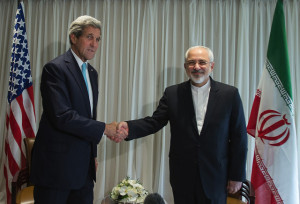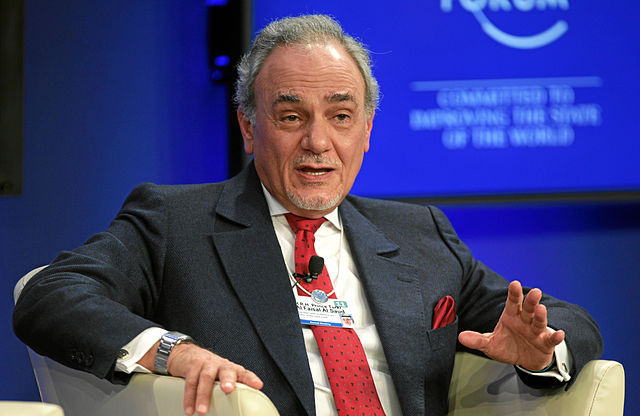Prince Turki al-Faisal warned that the Middle East will see a nuclear arms race if an Iran deal gives the Islamic Republic the capability to produce the bomb.
By: Reuters and World Israel News Staff


Secretary of State John Kerry meets with Iranian Foreign Minister Javad Zarif. (US Mission Geneva)
Any terms that world powers grant Iran under a nuclear deal will be sought by Saudi Arabia and other Mideastern countries, risking wider proliferation of atomic technology and eventually a nuclear arms race in the Middle East, a senior Saudi prince warned on Monday in a BBC interview.
“I’ve always said whatever comes out of these talks, we will want the same,” said Prince Turki al-Faisal, who previously served as head of Saudi intelligence and Riyadh’s ambassador to Washington and London but is no longer a government official.
Saudi Arabia and other Arab Gulf states view Iran as their main regional rival and fear that an atomic deal would leave the door open to Tehran gaining a nuclear weapon or ease political pressure on it, giving it more space to back Arab proxies opposed by Riyadh.
Shi’ite Iran and Sunni Saudi Arabia are religious opponents. Both have been backing terror organizations in the region fighting religiously motivated battles throughout the Middle East, attempting to undermine each other’s influence in the region .
Iran and the six world powers (P5+1) are holding talks to reach a deal aimed at assuaging fears that Tehran is using the fuel enrichment process of its atomic power program to secretly develop a nuclear weapon.
Tehran, hoping to be rid of heavy international sanctions that have taken a toll on its economy, denies that charge, claiming that their program exists only for “peaceful” purposes.
“If Iran has the ability to enrich uranium to whatever level, it’s not just Saudi Arabia that’s going to ask for that,” the prince was quoted as saying by the BBC.
Although Prince Turki is not a Saudi official, his comments are widely understood to reflect the thinking at senior levels of the Al Saud ruling family.
“The whole world will be an open door to go that route without any inhibition, and that’s my main objection to this P5+1 process,” said the prince, who is a brother of Foreign Minister Prince Saud al-Faisal.
Sunni Fears of Shi’ite Weaponization
Secretary Kerry sits with King Salman of Saudi Arabia. (Flickr)
Arab governments are reportedly concerned about the negotiations between the P5+1 powers and Iran regarding Iran’s nuclear program, fearing that a deal with the Islamic Republic would endanger their own security.
Reports indicate that the Obama administration has agreed to many of Tehran’s demands, leaving it with threshold nuclear capabilities that would enable it to develop a nuclear weapon within a few months. US officials are quoted as saying that it is no longer plausible to eliminate Iran’s entire nuclear infrastructure, suggesting that any final deal would leave some of their nuclear capabilities in place.
In a rare piece, Faisal Abbas, editor-in-chief of the prominent Saudi Al-Arabiya newspaper, showed support for Prime Minister Benjamin Netanyahu and his address to a special session in Congress on the Iranian nuclear threat, stating, “One must admit, Bibi did get it right, at least when it came to dealing with Iran.”
“The Israeli prime minister managed to hit the nail right on the head when he said that Middle Eastern countries are collapsing and that terror organizations, mostly backed by Iran, are filling in the vacuum.”

